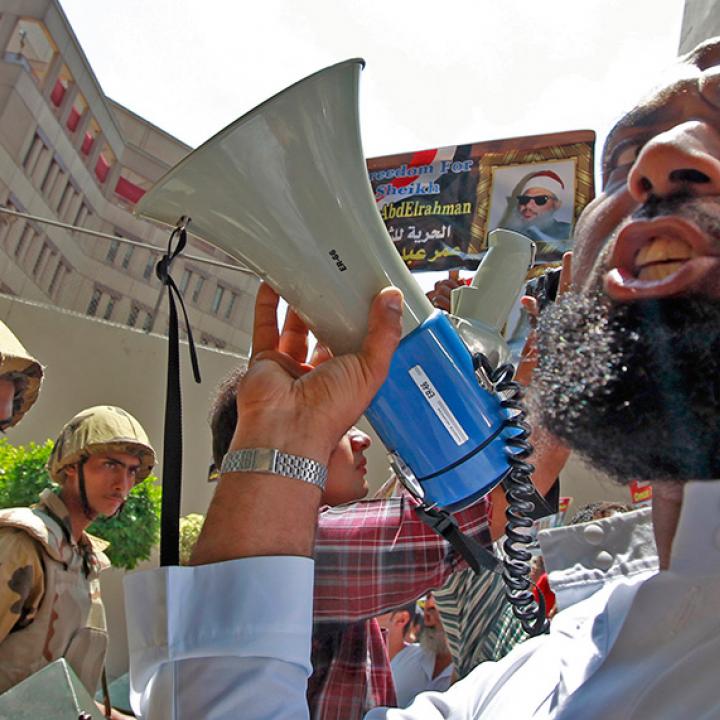
- Policy Analysis
- Fikra Forum
The Ideological Extremism of Al-Azhar

Sheikh Ahmed Al-Tayyeb, the Grand Sheikh of the prestigious Al-Azhar institute, did not equivocate when responding to the 2015 Paris attacks: “We denounce this hateful incident. The time has come for the world to unite to confront this monster [ISIS].”
Yet a sizable roster of Muslim reformers, scholars, researchers, and media figures in Egypt have denounced Al-Azhar’s position toward ISIS with equal conviction. Despite the religious and educational institute’s public condemnation of some of ISIS’s activities, a debate swells over whether Al-Azhar systematically espouses the intolerance and violence preached by the group.
Among the most prominent Al-Azhar skeptics is Egyptian TV anchor Ibrahim Essa, who argues that the institute’s curriculum is in some ways ideologically indistinguishable from what ISIS promotes. He has supported his claim by pointing to an excerpt from a book used at Al-Azhar high schools, Persuasion: On Decoding Abu Shuga's Terms/Expressions. In a January 2015 TV program, Essa noted how this text claims that fighting infidels, even if they have not attacked Muslims, is a religious obligation for every able and free Muslim man. The rationale is that since infidels do not convert to Islam even though Islam is a well-known religion, then Muslims should attack and kill them whenever possible. This reasoning seems to differ little from the calls of ISIS encouraging Muslims to kills those who do not believe in Islam.
Another disturbing parallel between ISIS and Al-Azhar philosophies is the justification of sexual slavery. Ahmed Abdo Maher, a lawyer and Islamic researcher, claimed in August 2014 on the TV talk show El-Ashera Masaan that Al-Azhar defends a Muslim military leader’s right to order captured women to sexually gratify his male troops.
The statements of Dr. Soaad Salah, the former dean of the Islamic studies faculty for women at Al-Azhar University, have supported Ahmed Abdo Maher’s assessment. In a 2014 airing of her TV show, The Woman’s Fiqh, she contended that Muslims have the right to enjoy sex slaves, or “melek al-yamen,” when Muslims conquer non-Muslims. She informed her viewers that, “If we [Egyptians] fought Israel and won, we have the right to enslave and enjoy sexually the Israeli women that we would capture in the war.” This mirrors the rationale used by ISIS to justify the sexual abuse of Yazidi women in Iraq. Yet Salah is viewed by some in Egypt as a moderate voice in Islam.
In the same El-Ashera Masaan episode, Ahmed Abdo also confronted Dr. Masmooa Abo Taleb, the former Dean of the Faculty of Islamic Studies for men in Al-Azhar University. Abdo challenged the former dean about his department’s belief that Muslims who do not pray on Friday should be killed. This teaching is stated in the explanation of the eighth hadith in the book Imam Nawawi's Forty Hadith. Abdo asserted that Al-Azhar has endorsed this and a number of other extremely violent views.
Dr. Masmooa Abo Taleb replied that there is a difference between those who do not pray because of laziness and those who miss Friday prayers intentionally. He then confirmed that Muslims who intentionally miss Friday prayer should indeed be killed. El-Sheikh Metwally Al-Shaarway (1911-1998), who received his education and worked at Al-Azhar for many years, thought that Dr. Taleb's views did not go far enough and issued an even stricter fatwa. In his own proclamation, Al-Shaarway called for the killing of Muslims who do not pray due to laziness, although he stated that they should be allowed three days to repent.
Al-Azhar’s history of declaring apostates is similarly concerning. Al-Azhar rejected the Nigerian Mufti Sheikh Ibrahim Salah El-Hosseini’s fatwa that members of ISIS are apostates rather than Muslims a week after its issue in December 2014. In an official statement, Al-Azhar claimed that members of ISIS are indeed Muslims, although their actions do not represent Islamic values.
Yet Al-Azhar has a long history of denouncing liberal Muslim thinkers as infidels. For instance, last June the former Grand Mufti, Azhari Sheikh Ali Gomaa, issued a fatwa declaring female Muslim writer Sherif El-Shobashy an infidel for urging others to respect a woman’s choice on whether or not to wear the veil. This willingness to denounce others belies the claim that has recently been put forward that Al-Azhar is simply refraining from classifying any Muslim as an infidel.
Were Al-Azhar’s domain limited to its own schools, the public controversy might not have reached its current scope. But Al-Azhar has also attempted to influence Egypt’s national education system. In 2012, Al-Azhar sent a note of objection to the Ministry of Education demanding the removal of a sentence in the Civil Education Curriculum for senior high school students that promoted religious tolerance. The book stated, “Respect whoever changes his religion, because the freedom to choose one’s religion is the foundation of belief, there is no enforcement in belief.” Al-Azhar insisted that this sentence was antithetical to the hadith of Prophet Muhammad: “kill whoever changes his religion.” As a result the Education Minister referred the authors of the book to be investigated. If Al-Azhar’s interest in denouncing moderates, preaching extremism, and championing its views for the Egyptian public continues, Egypt may face a threat from within its own borders.
ISIS isn’t the only force against which the world needs to unite. Unless nefarious interpretations of Islam are removed from books read by young Muslim students, the ideological foundation upon which ISIS developed will continue to stand even after ISIS falls. A curriculum change is much needed at Al-Azhar.


